When it comes to finding the perfect canine companion, it's essential to consider a breed's unique characteristics and traits.
Take, for example, the Icelandic Sheepdog. This delightful breed, with its origins tracing back to Viking settlers, has captured the hearts of many dog lovers with its loyalty, affection, and all-around friendliness.
But there's more to the Icelandic Sheepdog than meets the eye. From its distinct coat to its suitability for apartment living, this breed offers a fascinating array of qualities that make it worth exploring further.
Key Takeaways
- Icelandic Sheepdogs are well-suited for apartment living due to their adaptability and desirable qualities such as being quiet, low-energy, and well-behaved.
- They are affectionate with their families and known for their unconditional love and loyalty.
- Icelandic Sheepdogs have high exercise needs and require a significant amount of physical and mental stimulation.
- Care considerations include potential health issues, regular grooming, early training and socialization, and responsible breeding practices.
Origin and Size
The Icelandic Sheepdog originated in Iceland over a thousand years ago, brought to the country by Viking settlers. This breed is of medium size, typically standing 16 to 18 inches at the shoulder and weighing between 20 to 30 pounds.
With its sturdy build and agile nature, the Icelandic Sheepdog is well-suited for herding. Its double coat is another notable characteristic, consisting of a medium-length and coarse outer coat, as well as a soft and insulating undercoat.
This coat provides protection against the harsh Icelandic weather. Despite its small size, the Icelandic Sheepdog is known for its endurance and ability to withstand the challenging terrain of its homeland.
Breed Group and Lifespan
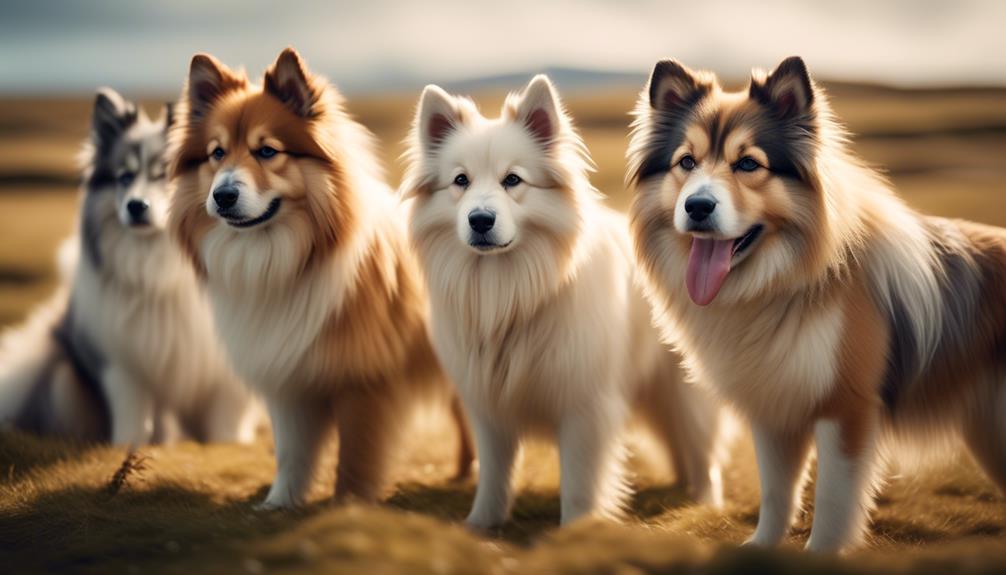
Originating in Iceland over a thousand years ago, the Icelandic Sheepdog is a versatile breed that belongs to the Herding Group and has a lifespan of 12 to 15 years. This breed is well-suited for herding and protecting livestock, as well as being a loyal and affectionate family companion.
Known for its intelligence and agility, the Icelandic Sheepdog is an excellent working dog and excels in various activities such as obedience, agility, and tracking. With its medium-sized build and sturdy frame, this breed is well-equipped for the harsh Icelandic climate and challenging terrain.
The Icelandic Sheepdog's double coat provides protection from the elements, with a coarse outer coat and soft undercoat. The coat comes in various colors including tan, brown, gray, and black, often with white markings. A bushy tail is a characteristic feature of this breed.
Coat Characteristics
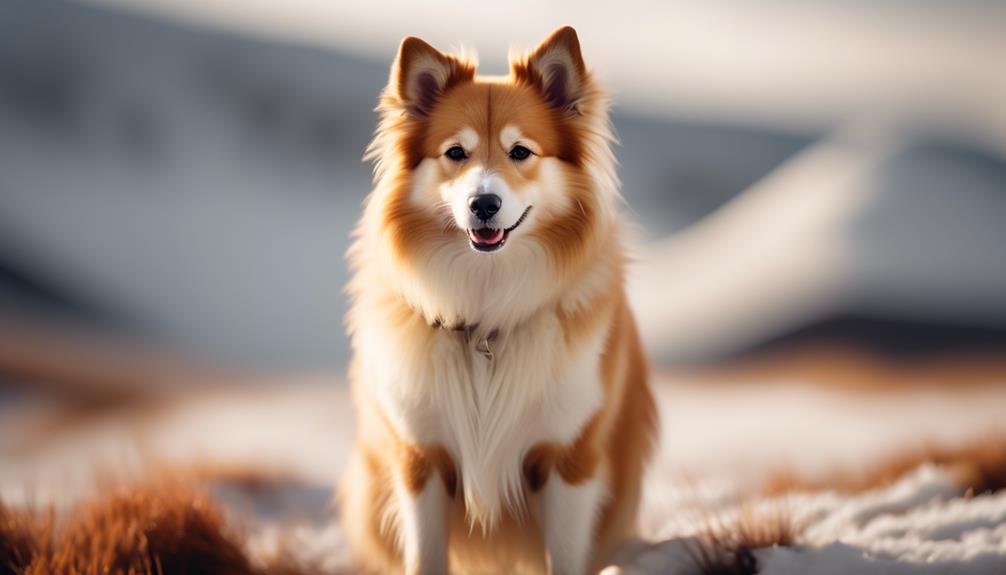
With its medium-sized build and sturdy frame, the Icelandic Sheepdog's coat characteristics contribute to its resilience in the harsh Icelandic climate. The breed has a double coat, consisting of a medium-length and coarse outer coat, as well as a soft and insulating undercoat. This combination provides excellent protection against the cold and wet weather, allowing the Icelandic Sheepdog to thrive in its native environment.
The coat comes in various shades of tan, brown, gray, and black, often with distinctive white markings. It can be straight or slightly wavy, with a bushy tail that's a characteristic feature of the breed. Regular brushing is necessary to maintain the coat's condition, ensuring that it remains waterproof and provides the necessary insulation for the Icelandic Sheepdog in any weather conditions.
Apartment Living Considerations
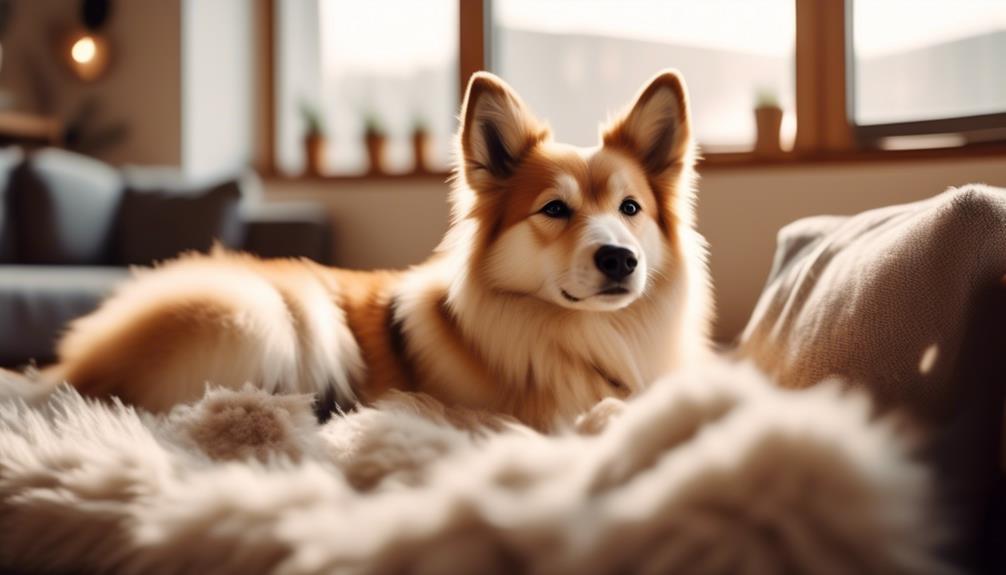
When considering apartment living, it's important to take into account the adaptability and characteristics of the Icelandic Sheepdog breed. Here are some key considerations for apartment living with an Icelandic Sheepdog:
- Size: The Icelandic Sheepdog is a medium-sized breed, typically measuring 16 to 18 inches at the shoulder and weighing between 20 to 30 pounds. Their compact size makes them well-suited for apartment living.
- Energy Level: Icelandic Sheepdogs have a moderate energy level. While they do require daily exercise, they aren't excessively high-energy dogs. Regular walks and playtime should be sufficient to meet their activity needs.
- Noise Level: Icelandic Sheepdogs are generally quiet and not prone to excessive barking. This makes them more suitable for apartment living where excessive noise can be a concern for neighbors.
- Training and Socialization: Like all dogs, Icelandic Sheepdogs benefit from early training and socialization. This will help ensure they're well-behaved and adaptable to different environments, including apartment living.
All-around Friendliness
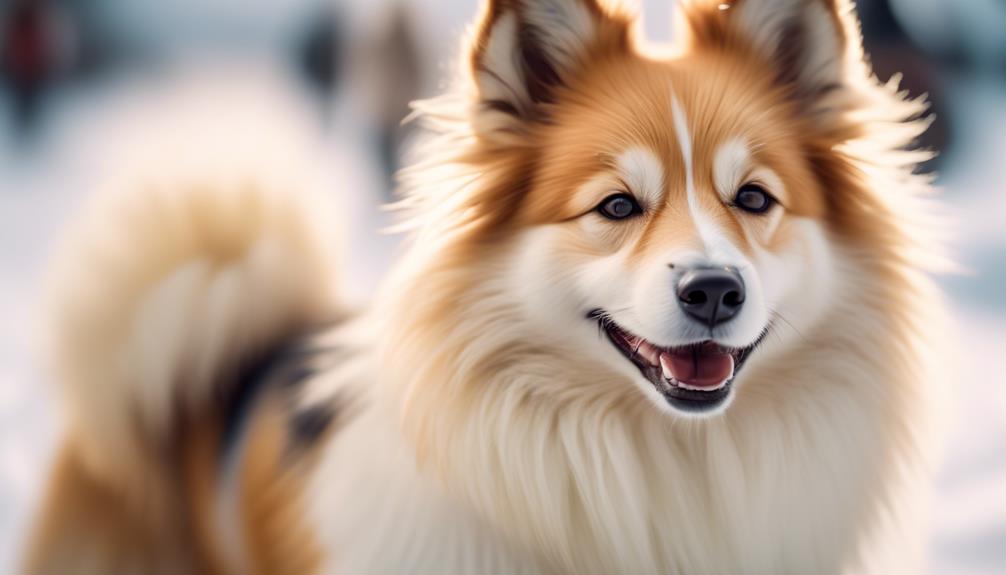
The Icelandic Sheepdog is renowned for its all-around friendliness, making it a beloved companion for families of all ages. These dogs are affectionate with their families and known for their unconditional love and loyalty. They bring warmth and joy to their families with their wagging tails and warm hearts.
Icelandic Sheepdogs are excellent with children and get along well with other pets, making them a great choice for multi-pet households. Their friendly nature extends to strangers as well, often making them poor guard dogs. However, their friendly and sociable demeanor makes them a perfect fit for families who are looking for a loving and amiable companion.
Whether it's snuggling on the couch or going for a hike, the Icelandic Sheepdog is always ready to be a faithful and friendly friend.
Exercise Needs
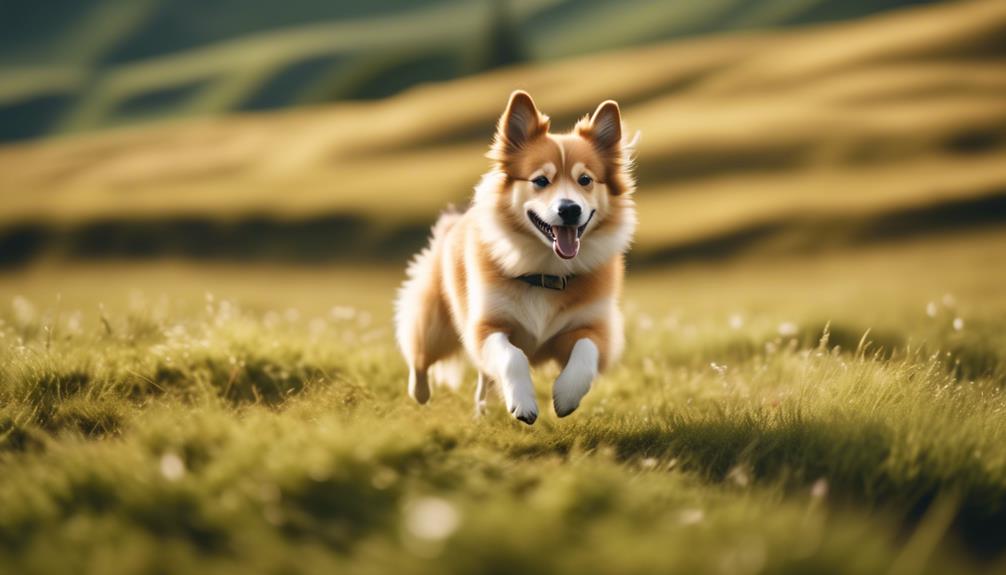
Icelandic Sheepdogs have high exercise needs and thrive on physical activity. To ensure their well-being, it's important to meet their exercise requirements.
Here are four key points to consider regarding the exercise needs of Icelandic Sheepdogs:
1) Daily Exercise: Icelandic Sheepdogs need regular exercise every day to keep them physically and mentally stimulated.
2) Vigorous Activities: They enjoy activities that allow them to use their energy, such as long walks, hikes, and interactive play sessions.
3) Mental Stimulation: In addition to physical exercise, these dogs benefit from mental stimulation, such as puzzle toys or training sessions.
4) Suitable Environments: Icelandic Sheepdogs are best suited for homes with a yard where they can run and play, but they can adapt to apartment living as long as they receive sufficient exercise and mental stimulation.
Health Concerns
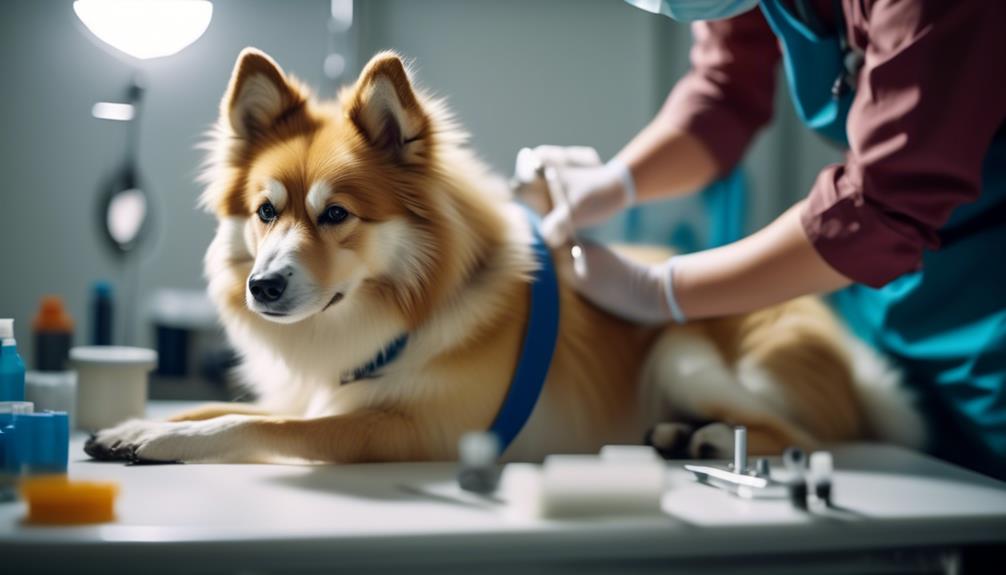
To ensure the overall health and well-being of Icelandic Sheepdogs, it is important to be aware of potential health concerns that may affect this breed. Some of the health issues that Icelandic Sheepdogs may be prone to include hip dysplasia, patellar luxation, and progressive retinal atrophy (PRA). Additionally, some individuals may have allergies, and obesity can be a concern. Regular grooming to maintain coat cleanliness and daily exercise to fulfill their activity needs are also important. It is recommended to start training and socialization early, schedule regular veterinary check-ups, and feed a balanced and nutritious diet. Responsible breeding practices, such as health clearances for parents, are crucial. By being proactive in addressing these health concerns, owners can help their Icelandic Sheepdogs live long and healthy lives.
| Health Concerns | |
|---|---|
| Hip Dysplasia | Patellar Luxation |
| Progressive Retinal Atrophy (PRA) | Allergies |
| Obesity |
Care and Grooming
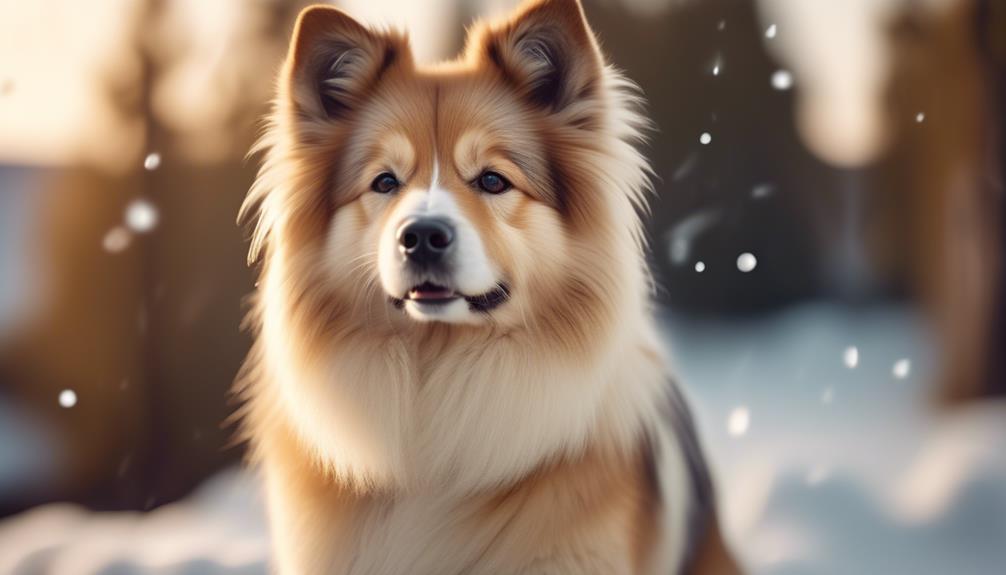
Regular care and grooming are essential for maintaining the health and appearance of the Icelandic Sheepdog. Here are four important aspects to consider:
- Coat maintenance: The Icelandic Sheepdog has a double coat that requires regular brushing to prevent matting and remove loose hair. Weekly brushing is necessary to maintain the coat's condition. The coat can be medium or long in length, and it comes in shades of tan, brown, gray, and black with white markings. Additionally, the bushy tail is a characteristic feature that should be kept clean and well-groomed.
- Exercise needs: Daily exercise is important to fulfill the Icelandic Sheepdog's activity needs. They're high-energy dogs that require a significant amount of physical activity and mental stimulation. Regular exercise helps prevent weight gain and behavioral issues.
- Training and socialization: Starting training and socialization early is crucial for Icelandic Sheepdogs. They're intelligent and eager to please, making them trainable and well-behaved companions. Consistent training and positive reinforcement methods are recommended.
- Regular veterinary check-ups: Scheduling regular veterinary check-ups is important to ensure the overall health and well-being of the Icelandic Sheepdog. These check-ups help detect any potential health issues early on and allow for timely intervention and treatment.
Training and Socialization
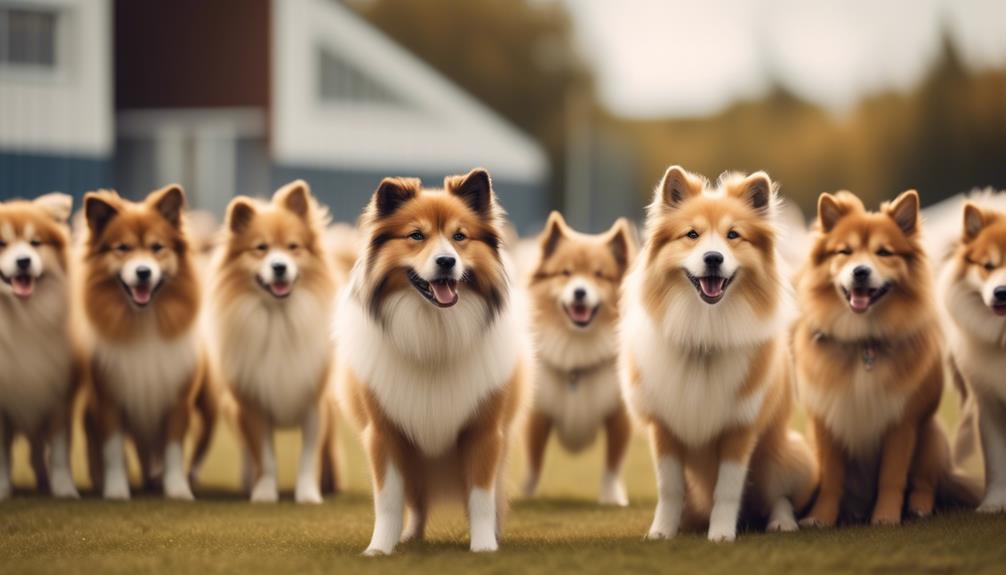
Training and socialization are crucial for the Icelandic Sheepdog to become a well-behaved and adaptable companion. This breed is intelligent and eager to please, making them highly trainable. Early and consistent training is recommended to establish good behaviors and prevent any potential behavior issues. Positive reinforcement methods, such as treats and praise, work best with this breed.
Socialization is equally important to ensure that the Icelandic Sheepdog is comfortable and confident in various situations. Exposing them to different people, animals, and environments from a young age helps them develop into well-rounded dogs. This breed thrives on human companionship and enjoys being part of the family.
With proper training and socialization, the Icelandic Sheepdog can become a loyal and well-mannered pet.
Choosing a Reputable Breeder
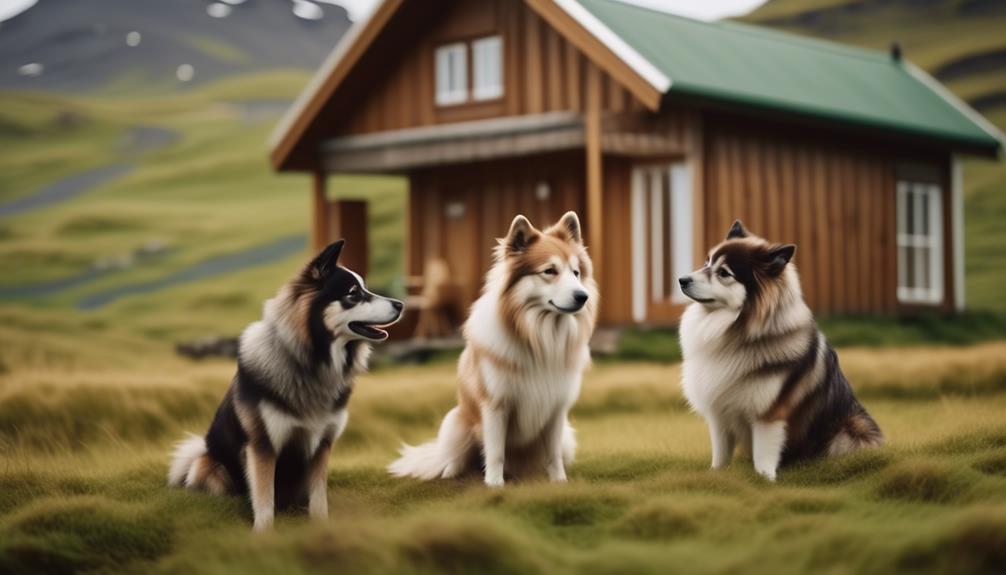
A key aspect of finding a healthy and well-adjusted Icelandic Sheepdog is choosing a reputable breeder. Here are four important considerations when selecting a breeder:
- Health clearances: Reputable breeders prioritize the health and well-being of their dogs. They'll provide health clearances for the parents, which demonstrate that they've been tested for genetic diseases and are free of any hereditary conditions that could be passed on to the puppies.
- Socialization: Responsible breeders also focus on the socialization of their puppies. They expose the puppies to various stimuli and experiences from an early age, ensuring that they're well-adjusted and confident dogs.
- Screening breeding stock: A reputable breeder will carefully select the breeding stock, taking into account factors such as health, temperament, and conformation. They'll screen the dogs for any potential health problems and only breed those with good overall qualities.
- Support and guidance: A reputable breeder will provide ongoing support and guidance to the new owners. They'll be available to answer any questions or concerns and offer advice on training, health care, and general well-being of the dog.
Rescue and Adoption Options
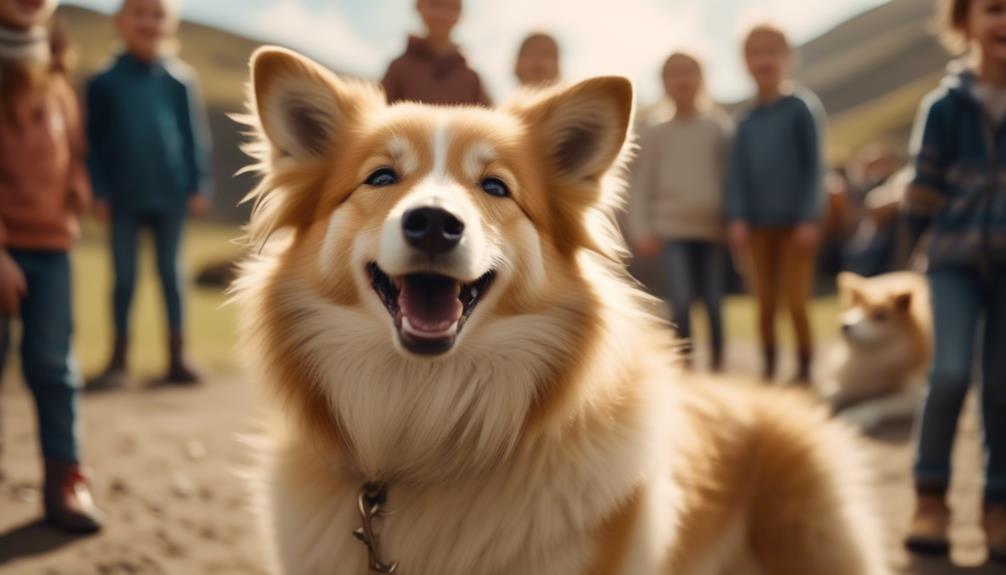
Rescue and adoption options for Icelandic Sheepdogs are available through various organizations and shelters.
The Icelandic Sheepdog Association of America (ISAA) offers a rescue referral program, connecting potential adopters with Icelandic Sheepdogs in need of homes.
Another organization, the National Icelandic Sheepdog Rescue Alliance (NISRA), specializes in rescuing and rehoming Icelandic Sheepdogs.
In addition to these specific breed rescues, local rescue organizations and animal shelters may occasionally have Icelandic Sheepdogs available for adoption.
It's important for individuals interested in adopting an Icelandic Sheepdog to research and communicate with these rescue groups to ensure compatibility and to understand the adoption process.
However, it should be noted that the availability of Icelandic Sheepdogs through rescue groups may vary depending on location.
Frequently Asked Questions
Are Icelandic Sheepdogs Good With Children?
Icelandic Sheepdogs are generally good with children. They are known for their affectionate and family-oriented nature, which makes them a great choice for families with kids. Proper socialization and training are important for a harmonious relationship.
Do Icelandic Sheepdogs Get Along Well With Other Pets?
Icelandic Sheepdogs generally get along well with other pets if properly socialized. They have a friendly and adaptable nature, making them good companions for other animals in the household. Proper introductions and supervision are important for a harmonious coexistence.
How Much Exercise Does an Icelandic Sheepdog Need Daily?
The Icelandic Sheepdog needs a moderate amount of exercise daily. They enjoy activities like walking, hiking, and playing games. Adequate exercise helps keep them mentally stimulated and physically fit, promoting their overall health and well-being.
Are Icelandic Sheepdogs Prone to Separation Anxiety?
Yes, Icelandic Sheepdogs can be prone to separation anxiety. They form strong bonds with their owners and may become anxious or distressed when left alone for long periods of time. Proper training and gradually increasing alone time can help mitigate this issue.
Can Icelandic Sheepdogs Be Left Alone for Long Periods of Time?
Yes, Icelandic Sheepdogs can be left alone for long periods of time, but it is not recommended. They are social dogs that thrive on companionship and may develop separation anxiety if left alone for extended periods.
What are the differences between Icelandic Sheepdogs and Maremma Sheepdogs?
The maremma sheepdog breed characteristics make them larger and more independent than Icelandic sheepdogs. Maremmas have a thick white coat and a strong protective instinct, while Icelandic sheepdogs are smaller, more agile, and known for their friendly and energetic nature. Both breeds are excellent herding dogs with unique traits.
Conclusion
In conclusion, the Icelandic Sheepdog is a wonderful and friendly breed that makes a great companion for families. With their loyal and affectionate nature, they bring joy to their owners' lives.
However, it's important to consider their exercise needs and grooming requirements before bringing them into an apartment setting.
By choosing a reputable breeder and considering rescue options, anyone interested in this breed can find a loving and well-cared for Icelandic Sheepdog to join their family.




